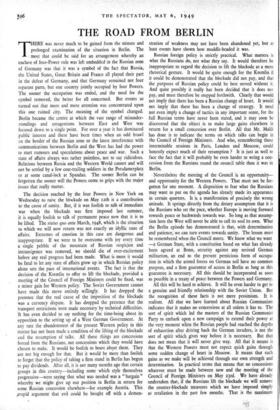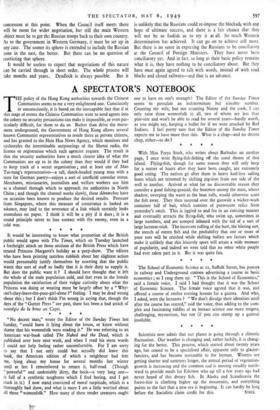THE ROAD FROM BERLIN
THERE was never much to be gained from the minute and prolonged examination of the situation in Berlin. The most that could be said for an arrangement whereby an enclave of four-Power rule was left embedded in the Russian zone of Germany was that it was a symbol of the fact that Russia, the United States, Great Britain and France all played their part in the defeat of Germany, and that Germany remained not four separate parts, but one country jointly occupied by four Powers. The sooner the occupation was ended, and the need for the symbol removed, the better for all concerned. But events so turned out that more and more attention was concentrated upon this one ruined city. The meaning of the symbol changed. Berlin became the centre at which the vast range of misunder- standings and antagonisms between East and West was focused down to a single point. For over a year it has 'dominated public interest and there have been times when an odd brawl on the border of the Russian zone or the latest interference with communications between Berlin and the West has had the power to start rumours and speculations about peace and war. Such a state of affairs always was rather pointless, not to say ridiculous. Relations between Russia and the Western World cannot and 'will not be settled by a few coat-trailing soldiers in the Potsdamerplatz or at some canal-lock at Spandau. The sooner Berlin can be forgotten the sooner will the Powers come to grips with the major issues that really matter. .
The decision reached by the four Powers in New York on Wednesday to raise the blockade on May 12th is a contribution to the cause of sanity. But, if it was foolish to talk of immediate war when the blockade was first imposed last summer, it is equally foolish to talk of permanent peace now that it is to be lifted. The status quo ante March, 1948, which is the situation to which we will now return was not exactly an idyllic state of affairs. Extremes of emotion in this case are dangerous and inappropriate. If we were to be overcome with joy every time a single pebble of the mountain of Russian suspicion and intransigence was removed, we should die of over-excitement before any real progress had been made. What is more it would be fatal to let any state of affairs grow up in which Russian policy alone sets the pace of international events. The fact is that the decision of the Kremlin to offer to lift the blockade, provided a meeting of the Council of Foreign Ministers could be fixed, was a minor gain for Western policy. The Soviet Government cannot have made this move entirely willingly. It has dropped the pretence that the real cause of the imposition of the blockade was a currency dispute. It has dropped the pretence that the transport restrictions were made necessary by technical difficulties. It has even decided to say nothing for the time-being about its opposition to the setting up of a West German Government. At any rate the abandonment of the present Western policy in this matter has not been made a condition of the lifting of the blockade and the resumption of talks. All these things are concessions forced from the Russians, not concessions which they would have chosen to make. It would be foolish to boast about them. They are not big enough for that. But it would be more than foolish to forget that the policy of taking a firm stand in Berlin has begun to pay dividends. After all, it is not many months ago that certain groups in this country—including some which style themselves progressive—were saying that what was needed was a "bargain" whereby we might give up our position in Berlin in return for some Russian concession elsewhere—for example Austria. This „stupid argument that evil could be bought off with a demon- , stration of weakness may not have been abandoned yet, but at least events have shown how muddle-headed it was.
Russian foreign policy is strictly practical. What matters is what the Russians do, not what they say. It would therefore be inappropriate to regard the decision to lift the blockade as a mere rhetorical gesture. It would be quite enough for the Kremlin if it could be demonstrated that the blockade did not pay, and that the purposes of Russian policy could be best served without it. And quite possibly it really has been decided that it does not pay, and must therefore be stopped forthwith. Clearly that would not imply that there has been a Russian change of heart. It would not imply that there has been a change of strategy. It need not even imply a change of tactics in any important sense, for the full Russian terms have never beep stated, and it may soon be discovered that the object is to make large gains elsewhere in return for a small concession over Berlin. All that Mr. Malik has done is to indicate the terms on which talks can begin in the Council of Foreign Ministers. And who, remembering those interminable sessions in Paris, London and Moscow, could honestly expect much of their resumption ? It is just as well to face the fact that it will probably be even harder to wring a con- cession from the Russians round the council table than it was in Berlin.
Nevertheless the meeting of the Council is an opportunity— and opportunity for the Western Powers. That must not be for- gotten for one moment. A disposition to fear what the Russians may want to put on the agenda has already made its appearance in certain quarters. It is a manifestation of precisely the wrong attitude. It springs directly from the dreary assumption that it is the Russians who set the pace, whether Europe is moving forward towards peace or backwards towards war. So long as that assump- tion lasts the West will never be able to call its soul its own. What the Berlin episode has demonstrated is that, with determination and patience; we can turn events towards sanity. The lesson must be remembered when the Council meets. We know what we want —a German State, with a constitution based on what has already been agreed at Bonn, security against any revived German militarism, an end to the present pernicious form of occupa- tion in which the armed forces on German soil have no common purpose, and a firm guarantee of access in Berlin as long as this guarantee is necessary. All this should be incorporated as soon as possible in a treaty of peace between the Powers and Germany.
All this will be hard to achieve. It will be even harder to get to a genuine and friendly relationship with the Soviet Union. But the recognition of these facts is not mere pessimism. It is realism. All that we have learned about Russian Communism indicates that it makes no concessions at all unless it has to. The sort of spirit which led the masters of the Russian Communist Party to embark upon a new campaign to extend their power at the very moment when the Russian people had reached the depths of exhaustion after driving back the German invaders, is not the sort of spirit which gives way before it is necessary. But that does not mean that it will never give way. All that it means is that the Western Powers must not expect quick gains through some sudden change of heart in Moscow. It means that such gains as we make will be achieved through our own strength and determination. In practical terms that means that no concessions whatever must be made between now and the meeting of the Council of Foreign Ministers on May 23rd. We have already undertaken that, if the Russians lift the blockade we will remove the counter-blockade measures which we have imposed simply as retaliation in the past few months. That is the maximum concession at this point. When the Council itself meets there will be room for wider negotiation, but still the main Western object must be to get the Russian troops back to their own country. As to the government in Western Germany, it must be set up in any case. The sooner its sphere is extended to include the Russian zone in the east, the better. But there can be no question of restricting that sphere.
It would be useless to expect that negotiations of this nature can be carried through in short order. The whole process will take months and years.. Deadlock is always possible. But it is unlikely that the Russians could re-impose the blockade with any hope of ultimate success, and there is a fair chance that they will not be so foolish as to try it at all. So much Western determination has achieved. It can go on to achieve still more. But there is no sense in expecting the Russians to be conciliatory at the Council of Foreign Ministers. They have never been conciliatory yet. And in fact, so long as their basic policy remains what it is, they have nothing to be conciliatory about. But they have once again agreed to talk with words, instead of with road blocks and closed railways—and that is an advance.







































 Previous page
Previous page